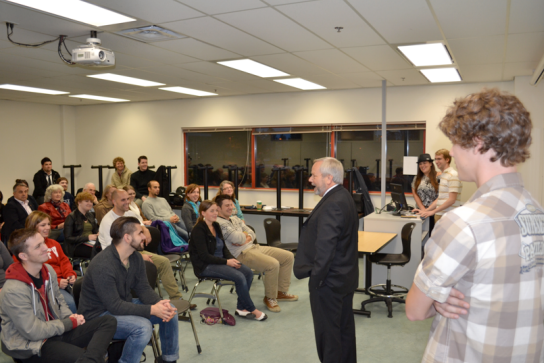Print Edition: October 24, 2012
The concept of tolerance is an extremely offensive one. In order for one person to tolerate another, the one must believe the other to be wrong. Inherent in my tolerance of you, there is something in you that I find to be intolerable. Tolerance cannot exist without a significant, meaningful disagreement.
Now, the temptation here is to say, “Yes! We must ignore that which divides us—quite frankly, it is insignificant or a private matter—and simply love each other.” While that sounds great, here is the problem. Truth matters. You believe that. You have no ground on which to disagree with it. If the statement is incorrect, how would you describe it? As false? A concise way I’ve heard it put; any system of thought that denies truth, denies itself.
And if truth matters, so do ideas and beliefs, so do ideologies and so does what we believe about tolerance. My question is this: are we willing to tolerate tolerance? Are we willing to accept that we all hold exclusive beliefs? Christianity is exclusive; if it is true, all other concepts of reality are incomplete or incorrect. Atheism is exclusive; if it is true, all other concepts of reality are incomplete or incorrect. Islam, Judaism, Buddhism and the recently created Vietnamese religion Cao Dai, are all exclusive.
Let’s take it a step further; the belief that no one faith or belief system has the right to claim exclusive truth is itself an exclusive belief, in that it excludes all those who would say “here is truth.” In this worldview, the only permissible exclusive truth is the one that says there is no exclusive truth. Good sir, your foot has just been shot through with your very own pistol!
Now, let me explain what I mean when I refer to this offensive idea of tolerance. French Canadian biblical scholar DA Carson argues in his book “The Gagging of God,” that there are two ways that we can view tolerance. The modernist way says this: “I believe you are wrong, ignorant and a bigot (and here is why…), but I will defend to the death your right to be wrong.” The modernist is tolerant of the individual, and vigorously elitist regarding truth. A shift has occurred, however, in what we assume tolerance to be. As our culture’s view of epistemology has changed, so too has our view of what it means to be a tolerant person.
To be tolerant today means to refuse to ever say that someone is wrong. In the post-modern version of tolerance, you are tolerant not of individuals, but of all views – except that view which disagrees with your concept of tolerance. In this case, the individual who disagrees with your view of tolerance is intolerant, and not to be tolerated. Feel free to disagree with me on what I believe to be the new tolerance, but please, realize the implications of your disagreement.
Take a deep breath.
Now, aside from the rampant inconsistencies in what I’ve described as post-modern tolerance, where does this leave us? The question is, are we going to tolerate tolerance? Is it permissible to be intellectually honest and admit that we all hold exclusive beliefs? Are we strong enough to tolerate individuals and be elitist regarding beliefs? Are we strong enough to engage in rigorous debate, disagree until we are blue in the face, and then go for a pint?
Last week, Pride and UCM held an event that raised many questions about what tolerance ought to look like in our society. Many in the room seemed to think that this kind of tolerance—the one which accepts individuals while rejecting their beliefs—was unacceptable. The problem in that, however, is that by deciding that it is not permissible to hold to traditional Christian beliefs regarding sexuality, one is necessarily deciding for the other what is true – sounds pretty exclusive.
In this case, the tolerance prescribed for Christians requires that they reject their own beliefs regarding sexuality in favor of accepting anothers.
Perhaps, instead of requiring that we leave our beliefs at the doorstep, we would all be better served if we brought them in. Only then can we meaningfully engage with each other as individuals who acknowledge the consequences of our beliefs, and the value of each other. To be in real community, we must engage both individuals and beliefs. One view of tolerance allows for this, while the other will engage the individual only once they’ve sufficiently altered their beliefs.
Take your pick.



